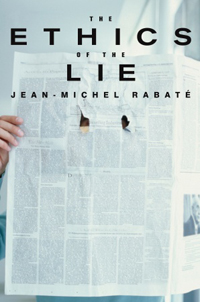Lies of the Land
Jean-Michel Rabaté considers political deception in the United States.

“To write about lies was for me to write about the United States,” explains Jean-Michel Rabaté, a member of the English department faculty and the Vartan Gregorian Professor in the Humanities, in his introduction to The Ethics of the Lie. “It is not that lying is more frequent in the United States than elsewhere, but, since the end of the Cold War, American culture has been polarized by this topic, finding in it an unlimited source of fascination, amusement, and horror.”
An English translation of the original French text (“Tout dire ou ne rien dire, Logiques du mensonge”) first released in 2005, Rabaté’s The Ethics of the Lie presents wide-ranging and critical examinations of the phenomena of lies—from media-propagated disinformation to private self-deception—rooted in a fascination with what the author sees as a core paradox in human nature. “We lie quite often, four to six times a day on average,” he writes. “At the same time, we do hate liars, and even more detest being lied to.”
With straightforwardly philosophical foundations and aims—the book grew out of a disagreement Rabaté identified between himself and mentor Jacques Derrida—The Ethics of the Lie is still very much situated in the real world of current events and recent political history. Rabaté is particularly interested in the lies of American presidents, considering at length the deceptions associated with the presidencies of Bill Clinton and George W. Bush.
Rabaté writes, “The question that everyone, including President Clinton, asked regarding the affair that led to the confession of the lie, was: ‘How could someone be so stupid?’ The question that most observers ask faced with the ‘untruths’ of President George W. Bush is different but parallel, and is often formulated as follows: ‘Is he lying or is he stupid?’” … George W. Bush’s strategy rests on this formulation, conceived in reaction to Bill Clinton’s ‘lie.’” Rabaté adds, “Such a strategy can only succeed in the United States, where the suspicion of intellectualism can destroy a political career.”
Rabaté observed related themes emerging in the recent Democratic primaries. “What interested me were the demographics of the voters. People for Obama tended to be younger, whereas people for Hillary tended to be older, within the same sensibility. This is a sort of basic psychology,” he says, “but I see this as a sign that when you’re older, you know that there will be lies, that people will be lying—even presidents—and that this is part of life. When you’re younger, you tend to be incensed, and you want something like a clean slate. We see Obama trying to say, ‘I am not a liar; I promise something totally new.’ And Obama supporters are already saying, ‘Please don’t disappoint us,’ which is an interesting admission in that they know they will be disappointed. They hope he’ll be elected, but they also know that they will be disappointed.”
Personally, Rabaté feels that it’s important to strike a balance between hope and skepticism. “A degree of cynicism is useful,” he explains, “but one shouldn’t fall into that French extreme of saying, ‘Oh, everybody is a liar; politics is disgusting; let’s enjoy life while we can, and then we die.’”
Rabaté believes that most Americans have learned from recent political deceptions. “I think the American public has become more skeptical and understands that they’ve really been led on for a long time,” he says. “They’re more aware that international situations are complex.” Recognizing complexity is key, according to Rabaté, who strongly cautions against moralistic simplifications. “As soon as one falls into that trap,” he says, “one is ready for any kind of lie.”

